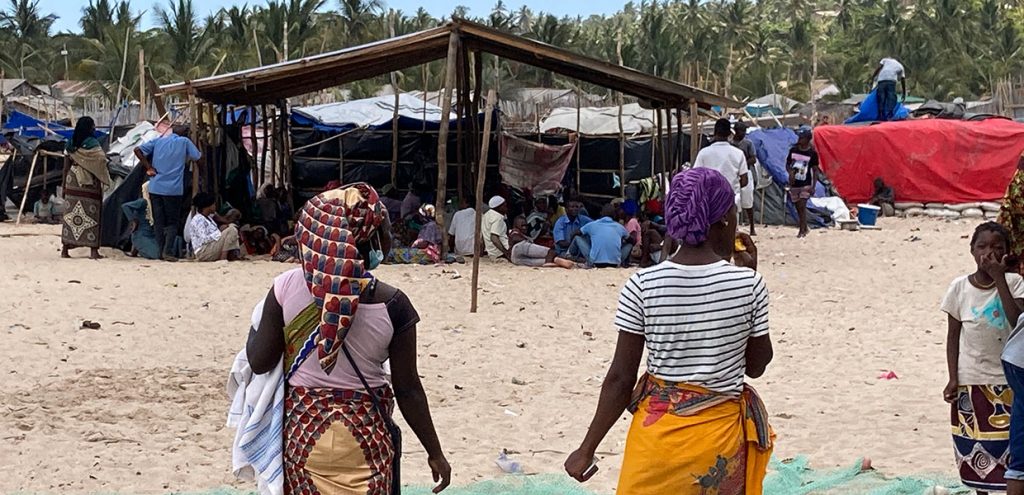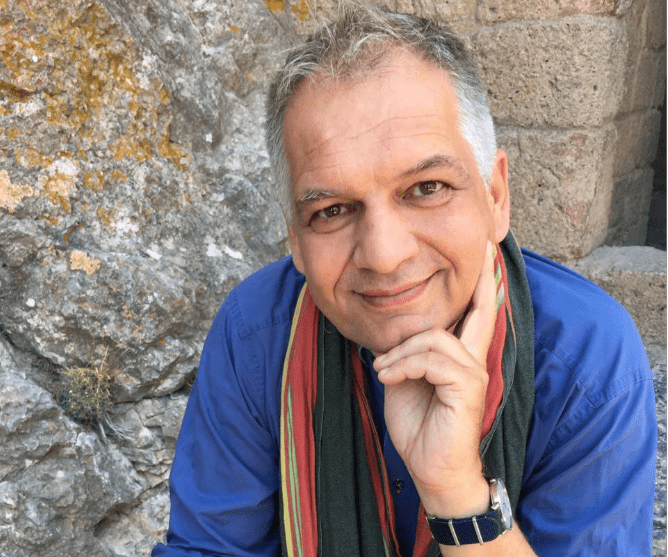Multiple Crises in Mozambique: The Terror of Cabo Delgado and its Consequences
The terror in the province of Cabo Delgado in Mozambique has already uprooted half a million people. The government in Maputo appears helpless in the face of violence from radical Islamists. From the local conflict accrues a problem for the entire region.
Perhaps he is a symbol of this crisis: Paulo Samuel Kankhomba, killed in action in 1968. A wooden statue on Pemba beach is dedicated to the icon of the Mozambican liberation front Frelimo. It stands on one of the few squares in the city that is not littered with garbage. But the hero himself looks severely maimed. The arms are stumps, the wood is weathering, the paint is flaking off. Could he still win a battle, instill courage in the soldiers, and inspire the state’s counter-terrorism forces to develop a strategy?
For three years now, violent Islamists have been terrorizing Mozambique’s northernmost province of Cabo Delgado and seem to be rushing from victory to victory. While initially only a few 10,000 people fled for fear of being attacked, the World Food Programme (WFP) estimates that there are currently half a million refugees in Cabo Delgado as a result of this conflict. Mozambique’s Prime Minister, Carlos Agostinho de Rosário, recently spoke of 560,000 people, which is almost a quarter of the total population in the province. Official figures on the fatalities are not available but between 1,000 and 4,000 people are said to have died.
WFP Country Director Antonella D’Aprile points out that the difficult security situation and blocked transport routes complicate reaching all those in need. In addition, the consequences of the two cyclones “Idai” and “Kenneth”, which devastated parts of Mozambique in 2019, are far from overcome. Now the rainy season lays ahead in Cabo Delgado, making roads become impassable and fostering the spread of cholera.
This scenario scares Karina Adia (50) and her husband Manuel Gustavo (57) (names changed). They sit on a bamboo mat in front of their improvised grass hut in the refugee camp Camp Nangua, west of the provincial capital Pemba. There have already been deaths in the camp, says Ms. Adia, and diarrhea is on the rise. Her husband says he feels “powerless like leaves in the wind”. He has no idea what his life will be like in the future. He had to leave his land in the Quissanga district, which fed him and his family well, when a warning came that “Al Shabab” would attack. He fled on foot and in minibuses to the camp about 120 kilometers away, where about 6,000 people found shelter. Here he shares his tiny hut, where, as he complains, the water reaches his ankles when it rains, with five relatives.
“Al Shabab” – this is what people call the Islamist militia, which according to the very few propaganda videos it disseminates, has set itself the goal of establishing a caliphate in Cabo Delgado, a so-called state of God with the Sharia as the basis of its law. The Islamists also announced that they wanted to drive the ruling party Frelimo from power in northern Mozambique. There is speculation about links to the Islamic State (ISIS). This, however, could be propaganda to give this originally local conflict a higher level of significance and threatening potential.
Analyst Emília Columbo of the US Centre for International Strategic Studies (CSIS) estimates that the strength of the Al Shabab, which has developed from a small sectarian minority into a military threat within 15 years, is about 1,000 fighters. Among their strengths are a solid financial base and the fact that they have not overstretched their forces so far. This could explain why – unlike in other African countries – attacks in the provincial capital Pemba and Maputo have so far failed to materialize. Suicide bombings have not been carried out either.
Economic hardship and lack of prospects are cited as one of the motives for the mostly young Islamists. João Feijó, a researcher at the Observatório do Meio Rural OMR, conducted interviews in Cabo Delgado and observed that some groups felt excluded from the province’s economic opportunities. He found that especially among the comparatively large group of young men there is considerable frustration, because their hopes for revenues from the projected gas production in the province have not yet been fulfilled.
For Tina Hennecken Andrade, Head of the Friedrich-Ebert-Stiftung’s Maputo office since 2016, “the Central Republic of the Islamic State envisaged by the Jihadists, which is to include areas in Tanzania, Mozambique and the DR Congo, is a new threat scenario” which demands a collective response from the SADC countries. Although the terror has not yet reached the gas companies’ installations in the Rovuma Basin, both falling prices and the security issues are likely to be a part of the investors’ calculations. The collapse of state sovereignty in parts of a province as important for Mozambique’s overall economy as Cabo Delgado – documented in the Bertelsmann Transformation Index (BTI) 2020 – threatens the hopes of the entire country to free itself from poverty with the proceeds from energy exports.
The government and Frelimo have been inseparably linked since independence in 1975. But in the terror zones of Cabo Delgado, being a member of the party of Eduardo Mondlane and Samora Machel means increased mortal danger. “Frelimo functionaries are the first ones, the Al Shabab fighters look for,” reports a Chefe de Localidade, a village chief who has moved his entire village to Camp Nangua. Since all jobs in government and administration go to Frelimo members, teachers, administrative and other officials have withdrawn from the areas between Muidumbe and Quissanga that are threatened by the Islamists.
Entrepreneurs are also affected. “They were looking for me,” says an independent auditor from ravaged Mocimboa da Praia in an interview. The 33-year-old lost his company headquarters, his private house, a car. Everything was burned down, including the company archives and the entire office equipment. Like other entrepreneurs, he does not know what he will have to live on in the future. “There is no one left in Mocimboa now who has nothing to do with the conflict,” he says, “the entire district is deserted.” A colleague from Mueda reports that he had to close his restaurant because he did not want to become a target for selling alcohol there. Staying outside in Mueda is safe only from 5 am and 5 pm, after that it becomes too dangerous. He has lost half of the fleet of his transport company because the route to Palma in the north is no longer safe. Of his 35 employees, he has dismissed 33.
Economic losses and human suffering add up to an overall situation that is difficult to manage, but which the world has barely taken notice of because other crises from Trump to Ethiopia dominate the news and because the Mozambican government has hardly allowed any journalists or television crews into the country. “But we need reporting,” says Pemba’s Bishop Luiz Fernando Lisboa. He expressly welcomed the fact that Mozambique’s government is seeking help abroad, including military support in the form of training, equipment, and logistics. Lisboa confirms indications that the Islamists are now kidnapping women and children. Like Boko Haram in Nigeria or the Lord’s Resistance Army in the Central African Republic, the militiamen need workers to provide for themselves. In depopulated areas they can hardly feed themselves, which is one of the reasons why they are forced to conquer and plunder ever more villages.
Where Al Shabab’s “insurgents”, as the government calls them, meet with resistance or smell treason, they take cruel revenge and, according to eyewitness reports, slit people’s throats. They cut off their victims’ heads and throw them onto the streets in pots as a sign of increased dehumanization before setting fire to their huts. What sounds like horror propaganda in a civil war is reported by a completely distressed refugee woman who has no reason and even less the concentration to think up such details. But neither the police nor the public prosecutor’s office are concerned with these crimes, which should also be a matter for the International Criminal Court in The Hague. Nobody questions the witnesses so that they feel heard, so that they can one day demand redress.
Mozambique’s armed forces, on the other hand, have so far proven to be ineffective in their actions and have a human rights record that also merits criticism. There are indications that many of their soldiers cannot communicate in the north because they do not speak the local languages there. The losses are high and the equipment is poor, while the enemy often knows in advance what the army is planning. The soldiers’ distrust of the local population is very high. The Zimbabwean mercenary chief Lionel Dyck, head of the Dyck Advisory Group, whose troops the government recruited for air support and intelligence among other things, speaks of major deficits in military operations.
As is often the case in such conflicts, the population directly affected feels completely unprotected. This may also explain the unusually high number of refugees, which is now attracting increasing international attention at the political level. The U.S. Coordinator for Counterterrorism, Ambassador Nathan A. Sales, promised U.S. support to the Mozambican government during a visit to Maputo in December 2020. The European Union has also made commitments that at least do not rule out a military component in the form of training.
Mozambique’s President Filipe Nyusi, whose second term in office is increasingly overshadowed by the conflict in Cabo Delgado, has publicly requested help from the international community on several occasions. But diplomatic circles in Maputo are unsure whether the Mozambican government knows exactly what it wants. It is possible that the state’s anti-terror strategy is controversial among the ruling Frelimo elite, which is losing sight of it in the struggle to succeed Nyusi as head of the party and head of state.
At the end of November 2020, heads of state from the South African Development Community (SADC) met to discuss the crisis in Cabo Delgado. While the current president of the African Union, South Africa’s President Ramaphosa, was among them, Filipe Nyusi, who currently holds the SADC presidency, did not attend himself, but sent a representative.
Stefan Ehlert is from Gütersloh in East Westphalia in Germany. With his family the historian and journalist lives as a freelance Africa correspondent in Maputo, Mozambique. He works for the epd, Deutschlandfunk, ARD radio and the Schwäbische Zeitung, among others. From 2001 to 2007 he reported from East and Central Africa, based in Nairobi. Since 2008 he has also reported from North and West Africa for the ARD radio studio Rabat. After a radio traineeship in Hamburg, he was a reporter and editor of the “Berliner Zeitung” in the late 1990s.


Complete and factual, wrapped in good use language.